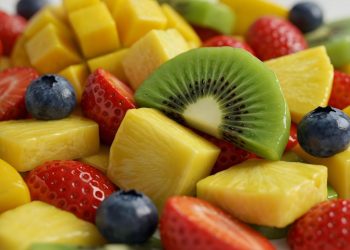Ever find yourself in a battle with sugar cravings? If you’re watching your blood sugar levels, you might have turned to fruits and vegetables for relief, but not all of them offer the same benefits. Enter blackberries, those plump, dark jewels that are not just delicious but also carry a wealth of health advantages, particularly when it comes to blood sugar control. So why should blackberries be a staple in your diet? Let’s dive into five compelling reasons.
Contents
1. Low Glycemic Index
One of the standout features of blackberries is their low glycemic index (GI). Foods with a low GI score are known to have a more gradual effect on blood sugar levels, making them ideal for those managing their glucose. According to the American Diabetes Association, foods with a GI of 55 or less are good choices for blood sugar regulation. Blackberries score just 25 on the glycemic index scale, which is quite low compared to many fruits. This means you can enjoy their sweet, tangy flavor without fear of a spike in your blood sugar.
Benefits and Limitations
While low-GI foods are beneficial, they aren’t a silver bullet. It’s essential to consider portion sizes. Eating excessive amounts of blackberries could lead to unwanted calorie intake. Therefore, moderation remains pivotal even when indulging in healthy foods.
2. Rich in Fiber
Blackberries are not just low in sugar; they are also rich in dietary fiber. A single cup of blackberries contains about 7.6 grams of fiber, which is substantial for such a small serving. Fiber plays a crucial role in digestion and can help stabilize blood sugar levels by slowing down the absorption of sugar into your bloodstream.
A study published in Nutrition Reviews suggests that higher fiber intake is associated with lower blood sugar levels and reduced risk of type 2 diabetes (Slavin, 2005). Additionally, fiber can help you feel full for longer, curbing the temptation to reach for less healthy snacks.
Benefits and Limitations
While fiber is crucial for blood sugar control, it’s worth noting that some individuals may experience digestive discomfort if their fiber intake is drastically increased all at once. Start with small portions of blackberries to see how your body reacts.
3. Packed with Antioxidants
Blackberries are loaded with antioxidants, particularly anthocyanins, which give them their rich color. Antioxidants help combat oxidative stress and inflammation in the body, both of which are known to contribute to insulin resistance. Managing inflammation can play a significant role in blood sugar control.
In a 2021 study published in the Journal of Nutritional Biochemistry, researchers found that anthocyanins can improve insulin sensitivity, which is crucial for maintaining balanced blood sugar levels (Böhm et al., 2021).
Benefits and Limitations
Though antioxidants are beneficial, relying solely on them without a varied diet can limit your overall health. It’s important to consume a diverse range of fruits and vegetables to ensure a well-rounded intake of nutrients.
4. Supports Weight Management
For many people, maintaining a healthy weight can significantly impact blood sugar control. Blackberries can aid in weight management due to their high water content and low-calorie count. At approximately 62 calories per cup, they provide a sweet treat without the guilt.
A study in the journal Obesity found that diets high in low-calorie foods rich in fiber can be effective for weight loss and management (Flood-Obbagy & Rolls, 2009). Including blackberries in your diet can help satisfy your sweet tooth while keeping your calorie count in check.
Benefits and Limitations
It’s worth noting that weight management is not solely about calorie counting. Lifestyle factors, such as stress and sleep, also play a role in weight fluctuations and blood sugar levels. While blackberries can support your efforts, they are just one piece of a larger puzzle.
5. Versatile for Incorporation into Your Diet
Last but not least, blackberries are incredibly versatile. Whether you add them to smoothies, sprinkle them on yogurt, or toss them into salads, the options are plentiful. This ease of incorporation makes it simpler to include them in your daily routine, something that can be beneficial for maintaining consistent blood sugar levels.
In a 2022 review in Frontiers in Nutrition, researchers highlighted the importance of making healthy food choices that you genuinely enjoy. When you find ways to include foods like blackberries in your meals, you’re more likely to stick to your dietary goals (Grieger et al., 2022).
Benefits and Limitations
Though blackberries are easy to include in various dishes, the cost can be a consideration, especially when they are out of season. Fresh berries can be pricey, so exploring frozen options can be a smart alternative without losing nutritional value.
FAQs
1. Can I eat blackberries if I have diabetes?
Yes, blackberries can be a great addition to a diabetes-friendly diet due to their low glycemic index and high fiber content.
2. How many blackberries can I eat per day?
A serving of about one cup of blackberries is generally considered healthy and can easily fit into most dietary plans. Pay attention to how your body responds.
3. Are frozen blackberries as nutritious as fresh?
Yes, frozen blackberries retain most of their nutrients and can be a cost-effective option when fresh berries are out of season.
4. Can I consume blackberries juice?
Juices may not provide the same benefits as whole blackberries, as they often lack fiber and can contain added sugars. Eating the whole fruit is advisable for better blood sugar control.
Conclusion
Incorporating blackberries into your diet can be a delicious and effective strategy for managing blood sugar levels. From their low glycemic index to their high fiber and antioxidant content, these berries pack a punch in your nutritional arsenal. However, balance and variety are essential, so remember that moderation and a holistic approach to your diet will yield the best outcomes.
Consider adding blackberries to snacks, breakfast cereals, or even smoothies. The more you explore, the more you’ll discover how these tiny fruits can enhance your health. So the next time you find yourself eyeing those blackberries at the store, go ahead and scoop them up. Your blood sugar will thank you!
References
- Slavin, J. (2005). Dietary fiber and body weight. Nutrition Reviews, 63(5), 125-134. URL: https://academic.oup.com/nutritionreviews/article-lookup/doi/10.1111/j.1753-4887.2005.tb00173.x
- Böhm, V., et al. (2021). Bioactive compounds from blackcurrant and their role in improving insulin sensitivity. Journal of Nutritional Biochemistry, 91. URL: https://www.sciencedirect.com/science/article/abs/pii/S0955286321001329
- Flood-Obbagy, J. E., & Rolls, B. J. (2009). The effect of fruit in a meal on the reduction of energy intake. Obesity, 17(5), 882-888. URL: https://onlinelibrary.wiley.com/doi/full/10.1038/oby.2008.513
- Grieger, J. A., et al. (2022). Food choices and dietary patterns associated with health outcomes. Frontiers in Nutrition, 9. URL: https://www.frontiersin.org/articles/10.3389/fnut.2022.845418/full
Get Your FREE Natural Health Guide!
Subscribe now and receive our exclusive ebook packed with natural health tips, practical wellness advice, and easy lifestyle changes — delivered straight to your inbox.















